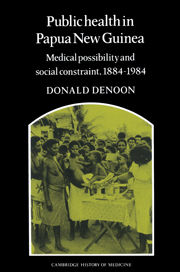Book contents
- Frontmatter
- Contents
- Acknowledgements
- Maps of Papua New Guinea
- Introduction
- I The rise and fall of tropical medicine
- 1 Pre-colonial health and disease
- 2 The administration of public health
- 3 Early colonial medical administration
- 4 The political economy of health in Papua between the wars
- 5 The political economy of health in New Guinea between the wars
- 6 Medical education
- 7 The Pacific War: the condition of the people
- II The rise and fall of the great campaigns
- Notes
- Bibliography
- Index
5 - The political economy of health in New Guinea between the wars
Published online by Cambridge University Press: 11 February 2010
- Frontmatter
- Contents
- Acknowledgements
- Maps of Papua New Guinea
- Introduction
- I The rise and fall of tropical medicine
- 1 Pre-colonial health and disease
- 2 The administration of public health
- 3 Early colonial medical administration
- 4 The political economy of health in Papua between the wars
- 5 The political economy of health in New Guinea between the wars
- 6 Medical education
- 7 The Pacific War: the condition of the people
- II The rise and fall of the great campaigns
- Notes
- Bibliography
- Index
Summary
On the face of it, New Guinea should have developed a more effective medical service than Papua. It was the first theatre of military operations for Australian troops in the Great War, and a substantial garrison remained until the Armistice. The plantation economy had been developed by German entrepreneurs into a genuinely profitable industry, which was then expropriated and distributed among Australian ex-servicemen, who also enjoyed preferential appointment to the sizeable peace-time public service. From 1914 onwards, therefore, the Australian Government paid it much more attention than Papua enjoyed. Then the 1930s were dominated by the growth of a great gold mining industry in the eastern fringe of the highlands, on a much greater scale than any enterprise in Papua; and it was from New Guinea that most of the highlands exploration was launched. Again, as a conquest state governed by ex-soldiers, its expatriate population was larger and more articulate and united than that of the sister dependency.
New Guinea was held under a League of Nations Mandate, and it provided a major new responsibility for the small federal bureaucracy, which had to share responsibility for most other functions, with the constituent states of the Australian Commonwealth. The mandated territory assumed particular significance for Australian health planners. The Commonwealth Constitution gave the federal government scant authority over the states in matters of health.
- Type
- Chapter
- Information
- Public Health in Papua New GuineaMedical Possibility and Social Constraint, 1884–1984, pp. 43 - 52Publisher: Cambridge University PressPrint publication year: 1989



